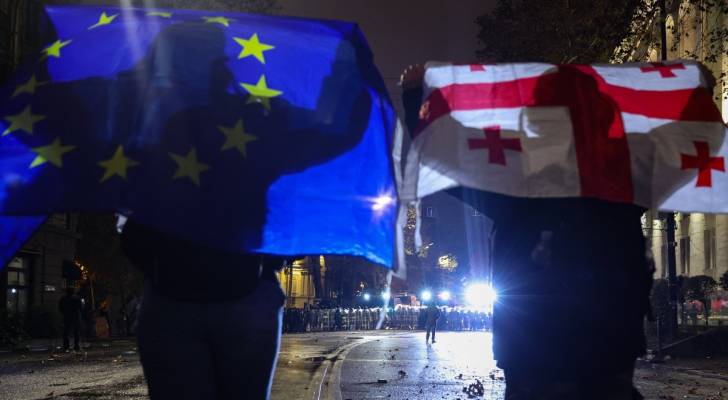Protesters hold up the EU and Georgian flags during Georgia protests (Credit: AFP)
What is happening in Georgia? Breakdown of recent events
In the heart of Tbilisi, tens of thousands of Georgians have taken to Rustaveli Avenue, the city’s historic thoroughfare, in a wave of protests marked by national flags, fireworks, and clashes with police.
The demonstrations were triggered by the ruling Georgian Dream party's decision to suspend talks on joining the European Union (EU) until 2028, a move that many see as a troubling shift toward Russian influence.
The unrest, which has escalated over recent days, is fueled by deep-seated frustration with the government’s perceived retreat from Georgia’s long-standing aspirations for closer ties with the West.
Riot police responded with tear gas and water cannons, while protesters, braving rain-soaked conditions, sang the national anthem amid rising flames and smoke.
A fire broke out in the Parliament building after objects were hurled during the protests, according to the Georgian Internal Affairs Ministry, which has accused demonstrators of “massively violating public order.”
- Widespread discontent -
Opposition leaders and citizens alike view the suspension of EU talks as yet another step toward a “quasi-Russian model,” echoing fears of Moscow’s growing sway in the region.
President Salome Zourabichvili publicly criticized Georgian Dream, accusing the ruling party of undermining the country’s European trajectory.
Protesters argue that EU membership represents not just economic and security benefits, but also a commitment to democratic values and human rights, which they feel are increasingly under threat.
According to a recent survey by the Georgian National Democratic Institute (NDI), nearly 80 percent of Georgians support joining the EU, further entrenching the widespread disapproval of the government's decision.
- Escalating tensions -
The protests are the latest in a series of public outcries against Georgian Dream, a party founded by Moscow-friendly billionaire Bidzina Ivanishvili.
Earlier this year, demonstrators filled the streets in opposition to a “foreign agent law” that mirrored Russian legislation used to suppress dissent. The law, which was ultimately withdrawn, added to a growing perception of the government’s drift toward authoritarianism.
Adding to the turmoil, the US State Department has condemned the excessive use of force against protesters. Spokesman Matthew Miller accused Georgian Dream of “antidemocratic actions,” warning that the government’s policies make Georgia more susceptible to Kremlin influence.
- A history of conflict -
Georgia’s aspirations for EU integration are deeply rooted in its history of conflict with Russia.
The 2008 Russo-Georgian War left scars that remain fresh in the national consciousness, with 20 percent of Georgia’s internationally recognized territory still under Russian control.
For many Georgians, EU membership symbolizes a path to security and independence from Russian dominance.
Accession to the EU would provide significant economic opportunities and security guarantees, particularly important amid ongoing tensions with Moscow.
- What lies ahead? -
As the demonstrations continue, the future of Georgia’s European aspirations hangs in the balance. The ruling party faces mounting pressure to reconsider its stance, but its critics fear that deeper ties with Russia could undermine Georgia’s democratic institutions and international standing.
For now, Rustaveli Avenue remains a battleground—not just for the physical clashes between protesters and police, but for the soul of a nation at a crossroads.




